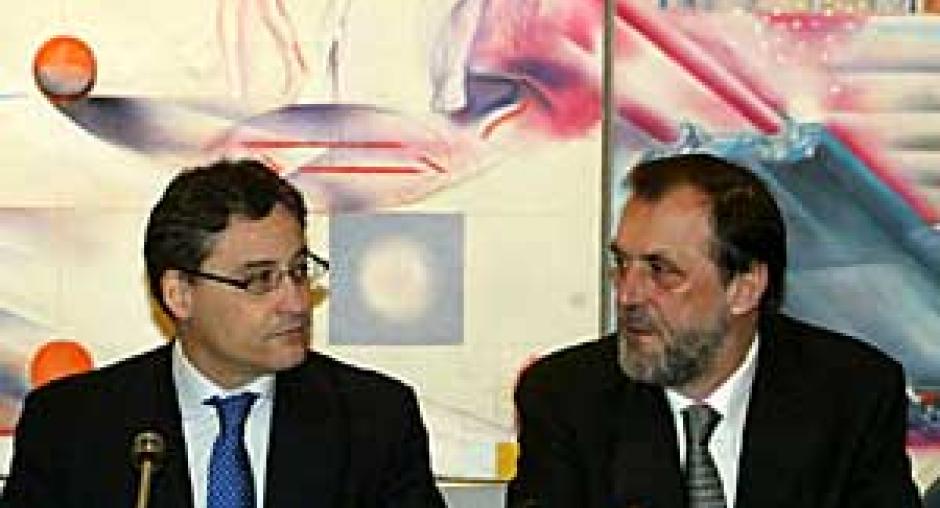Newsroom
Opening of secret service files important for democracy and justice in Serbia and Montenegro, OSCE mission head says
BELGRADE 5 March 2005

(OSCE/Milan Obradovic)Serbia and Montenegro Foreign Minister Vuk Draskovic (right) and OSCE Mission Head Maurizio Massari during discussions on the opening of files of the secret services in Serbia and Montenegro, Belgrade, 5 March 2005. (OSCE/Milan Obradovic) Photo details
BELGRADE, 5 March 2005 - The Head of the OSCE Mission to Serbia and Montenegro, Ambassador Maurizio Massari, today said the opening of secret service files was very important for the democratic culture and the protection of individual rights in the country.
"The question is not if, but when and how to address the issues and resolve them for the sake of democracy and justice," he told participants in an OSCE roundtable in Belgrade.
Serbia and Montenegro Foreign Minister Vuk Draskovic and the Head of the Council of Europe Office in Belgrade, Stefano Valenti, also gave keynote speeches at the meeting, focussing on the issue.
"While experiences of other countries are valuable, each country is a case for itself having to face this issue relying primarily on its own political forces and elites, including the civil society," Massari said in his opening remarks. He added that no post-authoritarian society, in Europe or elsewhere, can avoid the issue of opening of secret files.
"There is no single model, but two principles must be respected," he said. "Opening of secret files should be done on a widest possible basis and the process should be conducted in an objective and professional way to minimize personal and political manipulations."
The Head of the OSCE Mission expressed his expectation that the workshop would initiate a debate on the issue and speed up the process of elaboration and adopting of an appropriate law.
He also said that legislation on opening of secret files should be accompanied by the establishment of effective parliamentary oversight over secret services, full implementation of the legislation on free access to information and work of independent courts.
Participants at the roundtable included members of Parliaments of Serbia and Montenegro and the two Member States, representatives of the security services and expert NGOs.
"The question is not if, but when and how to address the issues and resolve them for the sake of democracy and justice," he told participants in an OSCE roundtable in Belgrade.
Serbia and Montenegro Foreign Minister Vuk Draskovic and the Head of the Council of Europe Office in Belgrade, Stefano Valenti, also gave keynote speeches at the meeting, focussing on the issue.
"While experiences of other countries are valuable, each country is a case for itself having to face this issue relying primarily on its own political forces and elites, including the civil society," Massari said in his opening remarks. He added that no post-authoritarian society, in Europe or elsewhere, can avoid the issue of opening of secret files.
"There is no single model, but two principles must be respected," he said. "Opening of secret files should be done on a widest possible basis and the process should be conducted in an objective and professional way to minimize personal and political manipulations."
The Head of the OSCE Mission expressed his expectation that the workshop would initiate a debate on the issue and speed up the process of elaboration and adopting of an appropriate law.
He also said that legislation on opening of secret files should be accompanied by the establishment of effective parliamentary oversight over secret services, full implementation of the legislation on free access to information and work of independent courts.
Participants at the roundtable included members of Parliaments of Serbia and Montenegro and the two Member States, representatives of the security services and expert NGOs.
